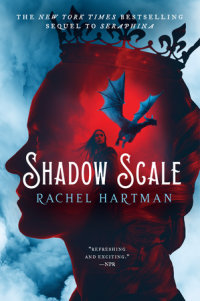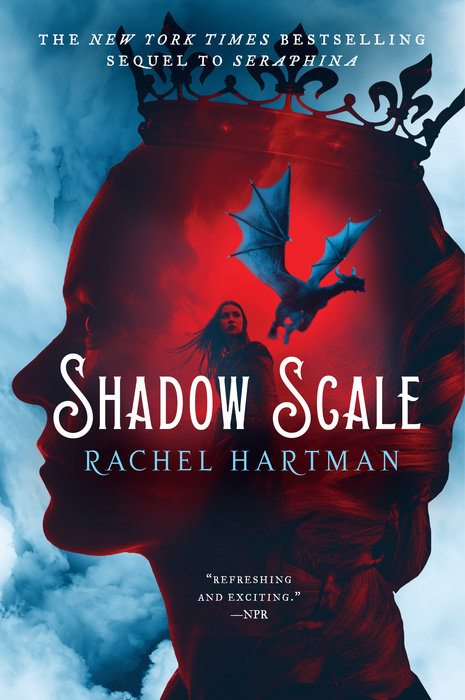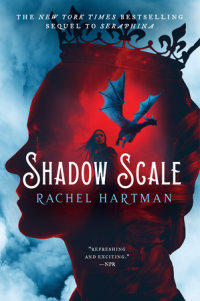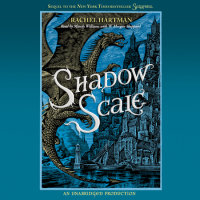I returned to myself.
I rubbed my eyes, forgetting that the left was bruised, and the pain snapped the world into focus. I was sitting on the splintery wooden floor of Uncle Orma’s office, deep in the library of St. Ida’s Music Conservatory, books piled around me like a nest of knowledge. A face looming above me resolved into Orma’s beaky nose, black eyes, spectacles, and beard; his expression showed more curiosity than concern.
I was eleven years old. Orma had been teaching me meditation for months, but I’d never been so deep inside my head before, nor felt so disoriented emerging from it.
He thrust a mug of water under my nose. I grasped it shakily and drank. I wasn’t thirsty, but any trace of kindness in my dragon uncle was a thing to encourage.
“Report, Seraphina,” he said, straightening himself and pushing up his spectacles. His voice held neither warmth nor impatience. Orma crossed the room in two strides and sat upon his desk, not bothering to clear the books off first.
I shifted…
I returned to myself.
I rubbed my eyes, forgetting that the left was bruised, and the pain snapped the world into focus. I was sitting on the splintery wooden floor of Uncle Orma’s office, deep in the library of St. Ida’s Music Conservatory, books piled around me like a nest of knowledge. A face looming above me resolved into Orma’s beaky nose, black eyes, spectacles, and beard; his expression showed more curiosity than concern.
I was eleven years old. Orma had been teaching me meditation for months, but I’d never been so deep inside my head before, nor felt so disoriented emerging from it.
He thrust a mug of water under my nose. I grasped it shakily and drank. I wasn’t thirsty, but any trace of kindness in my dragon uncle was a thing to encourage.
“Report, Seraphina,” he said, straightening himself and pushing up his spectacles. His voice held neither warmth nor impatience. Orma crossed the room in two strides and sat upon his desk, not bothering to clear the books off first.
I shifted on the hard floor. Providing me with a cushion would have required more empathy than a dragon—even in human form—could muster.
“It worked,” I said in a voice like an elderly frog’s. I gulped water and tried again. “I imagined a grove of fruit trees and pictured the little Porphyrian boy among them.”
Orma tented his long fingers in front of his gray doublet and stared at me. “And were you able to induce a true vision of him?”
“Yes. I took his hands in mine, and then . . .” It was difficult to describe the next bit, a sickening swirl that had felt as if my consciousness were being sucked down a drain. I was too weary to explain. “I saw him in Porphyry, playing near a temple, chasing a puppy—”
“No headache or nausea?” interrupted Orma, whose draconic heart could not be plied with puppies.
I shook my head to make sure. “None.”
“You exited the vision at will?” He might have been checking a list.
“I did.”
“You seized the vision rather than it seizing you?” Check. “Did you give a name to the boy’s symbolic representation in your head, the avatar?”
I felt the color rise in my cheeks, which was silly. Orma was incapable of laughing at me. “I named him Fruit Bat.”
Orma nodded gravely, as if this were the most solemn and fitting name ever devised. “What did you name the rest?”
We stared at each other. Somewhere in the library outside Orma’s office, a librarian monk was whistling off-key.
“W-was I supposed to have done the rest?” I said. “Shouldn’t we give it some time? If Fruit Bat stays in his special garden and doesn’t plague me with visions, we’ll be certain—”
“How did you get that black eye?” Orma said, his gaze hawkish.
I pursed my lips. He knew perfectly well: I’d been overtaken by a vision during yesterday’s music lesson, fallen out of my chair, and slammed my face against the corner of his desk.
At least I hadn’t smashed my oud, he’d said then.
“It is only a matter of time before a vision fells you in the street and you are run over by a carriage,” Orma said, leaning forward, elbows on his knees. “You don’t have the luxury of time, unless you plan to stay in bed for the foreseeable future.”
I carefully set the mug on the floor, away from his books. “I don’t like inviting them all into my head at once,” I said. “Some of the beings I see are quite horrifying. It’s awful that they invade my mind without asking, but—”
“You misunderstand the mechanism,” said Orma mildly. “If these grotesques were invading your consciousness, our other meditation strategies would have kept them out. Your mind is responsible: it reaches out compulsively. The avatars you create will be a real, permanent connection to these beings, so your mind won’t have to lunge out clumsily anymore. If you want to see them, you need only reach inward.”
I couldn’t imagine wanting to visit any of these grotesques, ever. Suddenly it all seemed too much to bear. I’d started with my favorite, the friendliest one, and that had exhausted me. My eyes blurred again; I wiped the good one on my sleeve, ashamed to be leaking tears in front of my dragon uncle.
He watched me, his head cocked like a bird’s. “You are not helpless, Seraphina. You are . . . Why is helpful not the antonym of helpless?”
He seemed so genuinely befuddled by this question that I laughed in spite of myself. “But how do I proceed?” I said. “Fruit Bat was obvious: he’s always climbing trees. That dread swamp slug can loll in mud, I suppose, and I’ll put the wild man in a cave. But the rest? What kind of garden do I build to contain them?”
Orma scratched his false beard; it often seemed to irritate him. He said, “Do you know what’s wrong with your religion?”
I blinked at him, trying to parse the non sequitur.
“There’s no proper creation myth,” he said. “Your Saints appeared six, seven hundred years ago and kicked out the pagans—who had a perfectly serviceable myth involving the sun and a female aurochs, I might add. But for some reason your Saints didn’t bother with an origin story.” He cleaned his spectacles on the hem of his doublet. “Do you know the Porphyrian creation story?”
I stared at him pointedly. “My tutor woefully neglects Porphyrian theology.” He was my tutor these days.
Orma ignored the jibe. “It’s tolerably short. The twin gods, Necessity and Chance, walked among the stars. What needed to be, was; what might be, sometimes was.”
waited for the rest, but that seemed to be it. “I like that myth,” he went on. “It corresponds to the laws of nature, except for the part where there are gods.”
I frowned, trying to understand why he was telling me this. “Is that how you think I ought to create the rest of the garden?” I hazarded. “Walk through my mind like a god?”
“It’s not blasphemy,” he said, replacing his spectacles and peering owlishly at me. “It’s a metaphor, like everything else you’re building in your mind. It is permissible to be the god of your own metaphors.”
“Gods aren’t helpless,” I said, with more bravado than I felt.
“Seraphina isn’t helpless,” said Orma solemnly. “This garden will be your bulwark. It will keep you safe.”
“I wish I could believe that,” I said, my voice frog-like again.
“It would probably help if you did. The human brain’s capacity for belief produces interesting neurochemical effects in the . . .”
I ignored the lecture, adjusted my posture, and set my knees akimbo with my hands upon them. Closing my eyes, I made each breath successively deeper and slower.
I descended into my other world.



